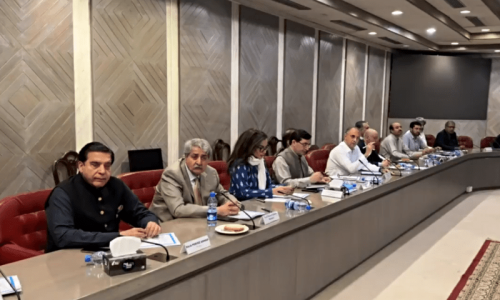ISLAMABAD: The Ministry of Climate Change on Sunday stated that each person in Pakistan inhaled approximately 31 out of every 1,000 plastic particles daily.
The ministry quoted a recent study published in the Environmental Science and Technology Journal in May 2024, which found that the per capita dietary intake of microplastics was around 31 milligrams per day. Microplastics, defined as plastic fragments smaller than five millimetres, could originate from industrial waste, beauty products, or the breakdown of larger plastic items.
The ministry said the presence of microplastics in various ecosystems had raised global concerns among environmentalists and health specialists. Studies have linked human uptake of microplastics to serious health issues such as endocrine disruption, weight gain, insulin resistance, decreased reproductive health and cancer.
Coordinator to the Prime Minister on Climate Change Romina Khurshid Alam underscored the country’s commitment to combating plastic pollution despite its relatively low ranking among nations facing the human uptake of microplastics.
PM’s coordinator advocates for replacing single-use plastics with innovative, degradable alternatives
In a statement issued by her ministry, Ms Alam emphasised the government’s collaboration with provincial authorities to address the growing environmental and public health issue.
“Managing plastics throughout their product life cycle and reducing their use when possible is crucial to mitigating the accumulation of microplastics in the environment and their uptake by humans through various organisms like fish, mussels and oysters,” she stated.
The coordinator, who leads the national anti-plastic campaign with support from provincial governments, industrial and corporate sectors, said microplastics are now a significant environmental and public health concern. They are detected extensively in freshwater and marine environments and are ingested, absorbed or consumed as food by organisms, eventually entering the human body.
“Industrial development exacerbates this environmental burden by elevating plastic pollution levels and shaping domestic dietary structures,” she added.
The study noted that airborne and dietary microplastic uptake had increased six-fold globally, posing severe risks to human health and environmental sustainability. Conducted by scientists from Cornell University, the first-ever global study mapped microplastic uptake across 109 countries from 1990 to 2018. It found that 57pc of plastic particles in foods come from aquatic sources.
The study highlighted the vast scale of plastic pollution affecting global coastlines and its impact on the United Nations’ Sustainable Development Goals (SDGs), particularly SDG 6 (Clean Water and Sanitation), SDG 14 (Life below Water) and SDG 15 (Life on Land). Malaysia ranks highest among the top 20 countries facing microplastic uptake risks, followed by Indonesia, Egypt, the Philippines, Vietnam, and others.
Southeast Asian countries like Indonesia, Malaysia, and the Philippines have the highest per capita dietary uptake of microplastics while China, Mongolia and the United Kingdom lead in airborne microplastic inhalation.
Ms Alam called for a global collaborative effort to tackle microplastic pollution and its potential public health risks. She urged governments in Asia, Europe, Africa, and the Americas to implement policy measures and incentives for removing plastic debris from freshwater and saltwater environments through advanced water treatment and effective solid waste management practices.
“Removing most aquatic plastic debris through water management for surface water quality control in freshwater watersheds, wetlands and lakes as well as ocean cleanups or effective solid waste management could significantly mitigate human microplastic exposure by 55pc,” she suggested.
She also advocated for replacing single-use plastics with innovative, degradable alternatives, such as edible biobased materials, to reduce microplastic release from packaging, especially in beverages.
Published in Dawn, July 15th, 2024














































Dear visitor, the comments section is undergoing an overhaul and will return soon.